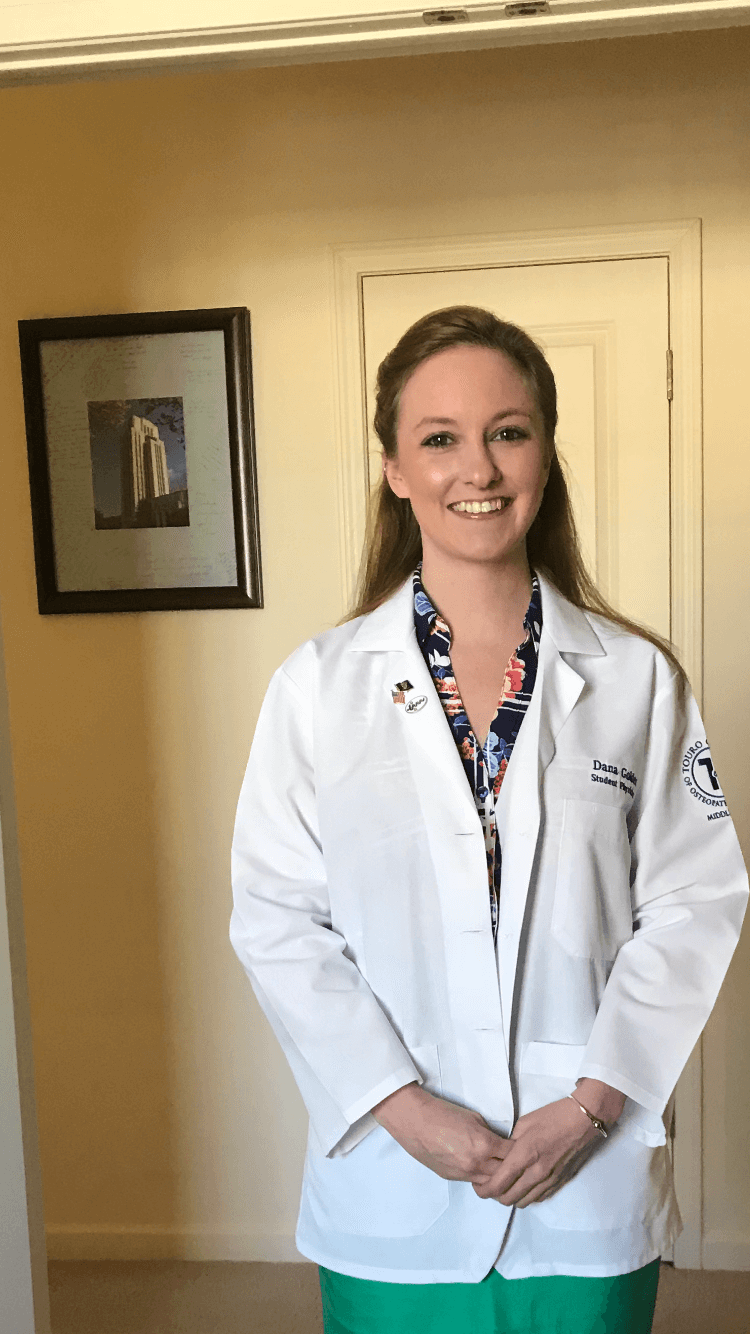Dana Golden
Naval Medical Research Center

For her summer vacation, TouroCOM Middletown student Dana Golden returned to a military lab where she had spent the last few years before enrolling in TouroCOM.
Golden is a recipient of the military’s Health Professional Scholarship Program. As part of the program, each student is required to spend 45 days in a form of military service. “I called up my old lab and asked if they wanted free help,” said Golden.
After graduating from University of Central Florida with a degree in molecular biology and microbiology, Golden moved to Maryland to work for the Naval Medical Research Center as a research assistant and research coordinator for regenerative medicine where she researched heterotopic ossification, abnormal growth of bone. In 2014, she joined the Department of Orthopedics at Walter Reed National Military Medical Center where she continued to research orthopedic trauma.
“It’s a huge medical issue since lots of our soldiers were dealing with it after stepping on explosives,” explained Golden. “They would come back and have bones growing unnaturally. Even if you’d remove it, they would grow back. It’s very debilitating. We were doing a lot of research on a way to treat and prevent it with drug therapy.”
Her experience in both military facilities, convinced her to apply to the HPSP.
“While I was working with the patient population I saw how much I was able to contribute and I also realized how much more I could contribute as a practicing physician,” said Golden. “I wanted to contribute in the best way I knew how.”
Golden said she always felt passionate about serving her country, which is a family tradition for her. “Almost everyone in my family has served. My father was army in Vietnam and my uncle was in the army as well.” (The fact that Golden plans to serve in the navy and not the army is a point of happy contention for the two: she has bought him several Navy Dad t-shirts.) As part of the HPSP program, the military funds Golden’s medical education in return for a multi-year commitment to serve in the military after graduation.
For her summer break, Golden returned to the Navy Medical Research Center.
“A lot of the research in the lab is looking to improve combat casualty care in our soldiers that are overseas,” Golden stated. “Each day we grapple with the question of how we can improve outcomes for soldiers in the field.”
During the summer, Golden tested cortisol levels in blood samples of injured primates, meant to simulate the reactions soldiers have in combat. “We looked at responses from the immune system and compared that data to stress hormones to paint a trauma picture. When you understand what is going on in the body during trauma, you can use that information to save lives.”
The lab expected that cortisol, a hormone that the body produces when stressed, would increase during traumatic incidents.
“When we were first looking at it, it seemed obvious that cortisol production would increase,” said Golden. “But it hasn’t really been tested that concretely. There was a previous model that looked at the production level with a single injury, but we added three or four different factors to create a more realistic injury pattern and there was a vast difference.”
“It was rewarding to come back and help finish projects that I had started prior to medical school,” explained Golden. “Coming back as a physician-in-training was very much like coming full circle. Research can certainly be repetitive and monotonous sometimes however the bigger picture is what matters. I hope this project continues to evolve and continues to impact the lives of our soldiers in a positive way.”
Most of Golden’s day-to-day work centered on testing blood samples using a 96 well culture plate with an enzyme-linked immunosuppressant assay (ELISA).
“It was a nice break from going to class every day and taking tests every week,” Golden laughed.

